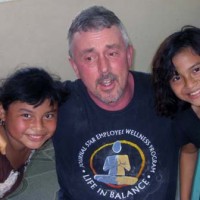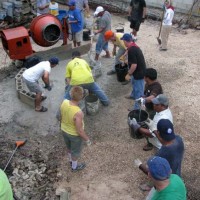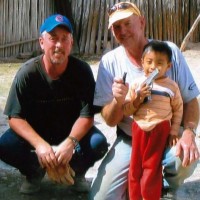Block by block: Building a church on the Yucatan Peninsula
The author, Terry Towery, with two youngsters from a tiny Mayan village where a group of Peorians work each year during a mission trip.
By this time next Thursday, I'll be hot and sweaty and wondering, yet again, just what in God's name I've gotten myself into. If all goes as planned, I will be working with a group of mostly Peorians alongside a group of Mayans building a tiny church in the jungle village of Nuevo Durango, about 100 miles inland from Cancun, Mexico, on the Yucatan Peninsula.
Brown-skinned Mayan children with the biggest, most beautiful black eyes you've ever seen will be scampering happily underfoot. It appears the only word they know in English is "Gringo." But they say it lovingly, we think, so it's all good. Still, it's no party. There are few, if any, modern tools in the jungle. We do it old-school, mixing concrete by hand, breaking big boulders into small boulders using picks with handles fashioned from trees the Mayans cut down in the surrounding jungle, and laying concrete blocks. It's stunning, really, how such a tiny structure can be composed of so many blocks. My back hurts just thinking about it.
(Photos courtesy of Terry Towery)
This will be the seventh consecutive year the group has spent a week toiling under the hot tropical sun alongside Mayans who speak little or no English and eat things that makes your skin crawl. Their specialty is some kind of black bean soup with a massive steamed chicken foot sticking out of it. Yum. A couple of years ago, they made us tortillas filled with cheese and the meat of a jungle mole that had the misfortune of wandering into the village one morning. (Not wanting to hurt their feelings, I took one bite and "accidentally" dropped my tortilla on the ground. A real shame, that was...)
This will be my sixth consecutive mission trip. And honestly, Fear Factor food and sore muscles aside, I wouldn't miss it for the world. A group of eighteen, most of us members of Peoria's Northminster Presbyterian Church, will board our plane at 6 a.m. Saturday bound for Cancun. We arrive at the Cancun International Airport mid-afternoon on Saturday, where we are met by our hosts, Wilian and Erly Cen Colli of the Yucatan Peninsula Mission.
Wilian is Mexican (as opposed to Mayan) and is a Presbyterian pastor who oversees about 20 tiny village churches throughout the Yucatan for YPM, which is headquartered in the U.S. His wife, Erly, is the daughter of a minister on the nearby island of Cozumel. Wilian's English is touch-and-go, but Erly is fluent in Spanish, English and Mayan, and she translates between the three languages all week.
For the record, they are two of the best people I have ever had the pleasure of knowing.
We stay at the YPM facility in the Mexican village of Leona Vicaro, about 40 miles inland as the crow flies from Cancun. The place where we stay is known locally as "The Gringo Hotel," again said lovingly (we think). The cinderblock facility has come a long way since we first went down in 2007, and is now painted a pleasing lemon yellow. It's surrounded by high security walls, beautiful pink climbing flowers, palms, and orange and lemon trees. We sleep on either cots or hammocks homemade in the village. Personally, I go for a cot since my back balks at the hammock after a day or two of work. Our meals, all local fare, are made there at the facility by a mother-and-daughter team, Mary and Terri. If they aren't the best cooks in the world, they are darned close. No jungle moles or chicken feet in their meals, thank you very much.
We rest on Saturday, go to one of the tiny village churches for services on Sunday and spend the remainder of the day reading and/or walking around Leona Vicario, which is so very poor. It's stunning to realize how people live only a relatively few miles from Cancun, one of the world's nicest vacations spots. Most people in Leona Vicario (many of whom work in Cancun's tourist trade for very little money) live in bamboo huts with tin roofs that have few, if any, modern amenities. Electricity and paved roads are still rare, although the village has made vast improvements over the past few years.
Starting on Monday, we get up early, eat a light breakfast and pile into two large panel vans for our hour-and-a-half trip through the scrubby jungle to our little Mayan village. We work for about seven hours, taking breaks every hour to prevent sunstroke, and head back around four in the afternoon. Once back at the Gringo Hotel, we take quick showers (thankfully we got warm water a couple of years back) and gather for our dinner feast. Afterward, we spend some time with the village kids, either singing, making crafts or playing games. No television or computers, although one year they surprised us by renting a flat-screen TV and we watched the Super Bowl and all of the commercials in Spanish. It was great fun and totally hilarious.
Around 9 p.m., a group of us head up on the roof of the facility and enjoy a good late-night cigar under the most beautiful tropical sky I've ever seen. Those evenings rank among the best of my life.
On Thursday, the day that's always hardest for me because I am by then totally exhausted, we stop working around noon and spend the afternoon with our Mayan friends. We visit and play games with the children. Sometimes, we ride the zip line the villagers operate as a tourist attraction. It goes over a very deep jungle gorge and, well, let's just say there's no OSHA overseeing safety conditions down there. Each year we take our Mayan friends suitcases earmarked for each individual family, stuffed with clothes, toys for the kids and toiletries. These are items generously donated by our church members, things they don't need nor want. But the look on the faces of the grateful Mayans when they receive what are essentially our castoffs is so touching we are often moved to tears. It's humbling to think how good we have it here, no matter our station in life.
After tearful goodbyes, we head back and crash after dinner and cigars. Friday is OUR day, the one day of the week we allow ourselves some selfish fun. In years past, we have toured Mayan ruins and visited a tropical island off the coast, where we swim in the Caribbean and drink coffee and smoke cigars at beautiful outdoor cafes dotting the narrow, cobbled streets. Saturday, we say our goodbyes to Wilian, Erly, Mary and Terri for another year and head off to the airport for the trip back. Bruised and battered, we are always glad to be home. But always, we think of next year.
We are hardly the only group of locals who do this sort of thing. I'm proud to say that central Illinoisans do mission work such as this far more often than most believe. From Haiti to Central America to the Yucatan, as well as places within the United States, you can find Peorians working hard to help those less fortunate. We are a very generous and giving city.
This year's team members, besides me, are: Bob and Connie Brandow, Doug Love, Lizzie DeHeer and Jim Witmer, all of Peoria; Andy Fograscher of Lacon; Luke Harvey of Chillicothe; Chris and Mary Kerr of Morton; Northminster Pastor Mike Shirey of Peoria Heights; Jay and LeeAnn Glatz, and Ric Fritz of Dunlap; Marcy Fritz of Osage Beach, Mo.; Valerie Daly of Ohio; and A.J. and Marlene LaSota of Kelowna, British Columbia, Canada.
I'll write a follow-up when we return. On a personal note, I would strongly encourage everyone to think about stepping out of your comfort zones and sign up for an overseas mission trip. There are few things in life so rewarding.
PHOTO CAPTIONS: A bucket line is formed as the Peorian mission team mixes concrete that is used to pour the floors and ceilings of a church it is building on the Yucatan Peninsula.
Terry Towery, left and Jim Wittmer, members of the Peoria mission team building a church in a Mayan village, spending time with their buddy known as Pistol Pete. He is called that because no one in the Peoria group can pronounce hi Mayan name. The pistol he is holding is, by the way, a toy.



